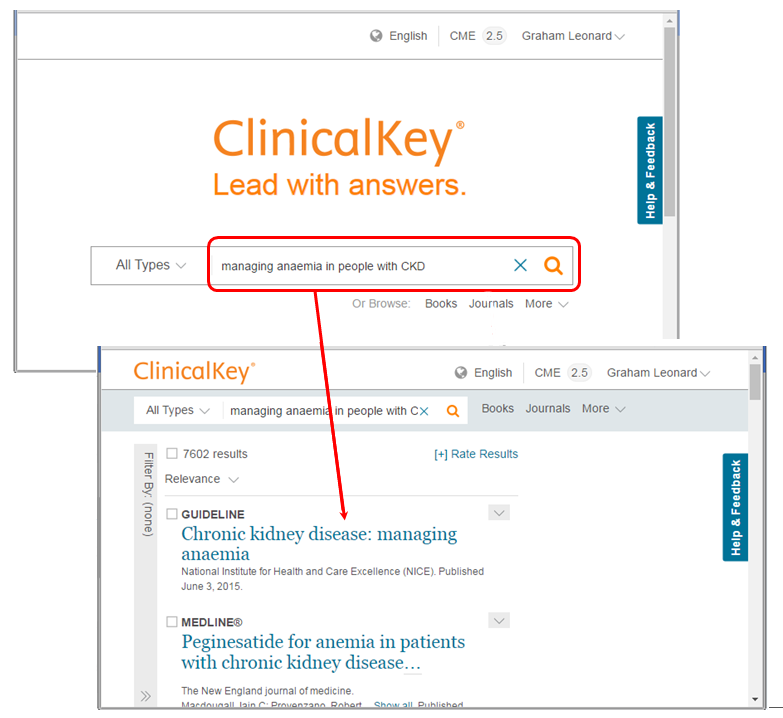NICE syndication API
Embed our content in your products and services.
Available content
Subject to agreement, you can use our syndication service to access all our guidance, including quality standards and information for the public.
We will forward enquiries about clinical knowledge summaries content to our supplier. We commission the content from Clarity Informatics.
British National Formulary content is available for syndication through its own API. This is subject to criteria and technical specification.
How it works
Syndicated content is provided through an application programming interface (API).
Once your application is accepted, you will receive a unique API key. This provides access to the specific services set out in your licence.
Someone with technical knowledge will need to integrate the API key with your platforms and systems. Our user guide will help you get started.
NICE syndication service and application programming interface (API) guide.
Licences
All requests to use our content via the syndication service will be covered by a licence.
There are 4 types of syndication licence:
A full licence for 4 years, with the option to renew when the term is finished.
A pilot licence for 1 year, to test the market for a newly developed product.
A metadata licence for 4 years, to allow the use of guidance metadata in products and services.
A test licence for 3 months, to assess the feasibility of developing a product.
All requests to use our content in the UK are covered by the NICE UK Open Content Licence, which forms part of the UK syndication licence.
Combined full/pilot licences have been produced for UK applicants and overseas applicants.
Delivery formats
Text/html
Application/atom+xml
Application/vnd.nice.syndication.services+json
Application/vnd.nice.syndication.services+xml.
What it costs
The service is free within the UK. We do not charge for:
use of our syndication service to deliver content in the UK
a UK/overseas metadata licence
a UK/overseas test licence.
We charge a fee for international use, where the syndication service will be used to deliver content outside of the UK.
How to apply
Step 1
Decide which licence you want to apply for.
You must agree to the terms and conditions as part of the application process.
The example licences on this page are for illustrative purposes only. We will give you a licence if your application is successful.
Step 2
Complete the application form (Excel)
Please fill in all the sections.
Enter a use case for each product or service you'd like to develop.
Step 3
Email [email protected] with:
your completed application form
the licence type you require
any supporting information to help your application (such as a screenshot).
Step 4
Create a NICE account to access the syndication service.
Step 5
Please note that on acceptance of a syndication application for a full or pilot licence, NICE will need you to complete a due diligence form.
Applications are considered on a regular basis.
Please email [email protected] if you have any questions.
Case study: Elsevier's clinical search engine
Elsevier is an information analytics company that provides over 25% of the world's clinical content. They used our syndication service to import NICE guidelines into their ClinicalKey search engine. Clinicians can use this to access information and inform their clinical decisions.

How did you find using the syndication service and API?
"The NICE syndication service provides a quality assured process to deliver digital content - an important requirement for robust and efficient data retrieval. The API, which is based on web services and REST principles, was a good fit with our solution architecture.
"Developers found the API intuitive and straightforward to use. The 'Guidance Data Service' is used via the API to transfer guidelines content into ClinicalKey. An import using the REST service, which returns XML formatted data, is fetched daily via the API. This augments the existing content within ClinicalKey's content database.
"The data returned from the API allows accurate indexing and categorisation of the guidelines within ClinicalKey, resulting in an excellent search and viewing experience for the end user."
How does NICE content benefit your users and business?
"Having NICE guidelines in our clinical solutions is extremely beneficial to users looking for evidence based recommendations relevant to their healthcare setting.
"Healthcare professionals can embed clinical decision support based on trusted recommendations directly into their workflow, supporting their decision making process at point of care.
"NICE guidelines extend and complement our existing evidence based offerings. They make sure our solutions meet the needs of clinicians and decision makers in the NHS and other healthcare bodies in the UK."
"Demand for NICE guidelines in ClinicalKey is not just limited to the UK; Elsevier's global customer base can now benefit from access to these guidelines. Usage is expected to be high outside the UK due to NICE being internationally recognised as a contributor to better health outcomes across the world."